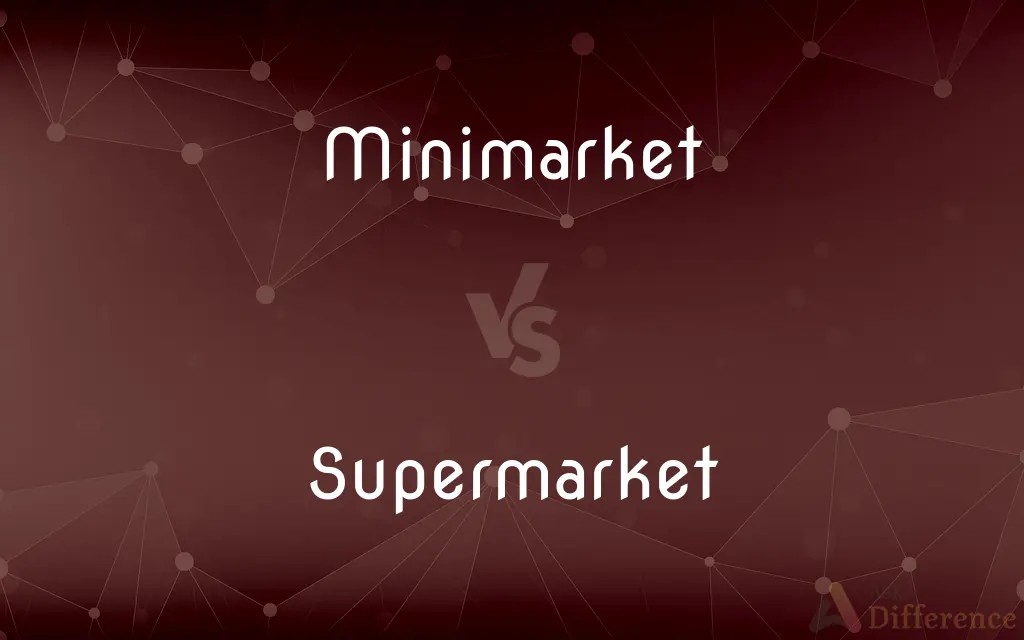Minimarket vs. Supermarket — What's the Difference?
By Tayyaba Rehman & Maham Liaqat — Updated on March 17, 2024
A minimarket is a small retail outlet offering a limited range of everyday items and convenience goods; a supermarket is a large store specializing in groceries and a wide variety of other consumer goods.

Difference Between Minimarket and Supermarket
Table of Contents
ADVERTISEMENT
Key Differences
Minimarkets, often found in neighborhood areas or near residential communities, cater to the immediate needs of local customers. Supermarkets, on the other hand, are much larger establishments that offer a wide variety of food products, including fresh produce, meats, dairy, and baked goods, as well as non-food items like cleaning supplies, personal care products, and sometimes even clothing and electronics.
While minimarkets prioritize convenience and proximity, supermarkets focus on variety, quantity, and pricing. Minimarkets are typically independently owned or part of a small chain, giving them a local feel and the flexibility to adapt their product offerings to the preferences of their community. Supermarkets are often part of larger chains or franchises, with standardized operations and selections tailored to a wide customer base.
The choice between shopping at a minimarket or a supermarket depends on the consumer's needs at the moment. For daily essentials or quick purchases, a minimarket offers speed and convenience. For weekly groceries or a more extensive range of products, a supermarket provides variety and competitive pricing. Each serves a unique role in the retail landscape, catering to different shopping needs and preferences.
The evolution of consumer preferences and the increasing demand for convenience have led to the emergence of hybrid formats, such as convenience stores with expanded product ranges and supermarkets with express checkout lanes or smaller footprint stores. These developments reflect the retail industry's adaptability and the blending of minimarket and supermarket features to meet diverse consumer needs.
Comparison Chart
Size
Small, limited floor space.
Large, extensive floor space.
ADVERTISEMENT
Product Range
Limited, focusing on essentials and convenience.
Wide, including groceries, fresh produce, and non-food items.
Pricing
May have higher prices due to lower volumes.
Often lower prices due to economies of scale.
Services
Basic, primarily retail sales.
Additional services like bakeries, delis, pharmacies.
Location
Neighborhoods, convenient for quick purchases.
Larger commercial areas, designed for comprehensive shopping trips.
Customer Focus
Immediate, daily needs and convenience.
Weekly shopping, variety, and bulk purchases.
Ownership
Often independently owned or small chains.
Usually part of larger chains or franchises.
Compare with Definitions
Minimarket
A small retail outlet offering daily necessities.
The neighborhood minimarket stays open late, offering snacks and basic groceries.
Supermarket
A large store offering a wide variety of groceries and goods.
The new supermarket offers everything from fresh produce to electronics.
Minimarket
Operates with longer hours.
The convenience of the minimarket is in its extended operating hours, especially useful for late-night purchases.
Supermarket
Specializes in extensive product selections.
For the weekly grocery haul, the supermarket is our preferred destination.
Minimarket
Serves immediate consumer needs.
For a quick snack or emergency supplies, the minimarket is the go-to spot.
Supermarket
Features additional services like bakeries and delis.
The supermarket not only sells groceries but also has a pharmacy and a bakery.
Minimarket
Often found in residential areas.
Every block seems to have its own minimarket for convenience.
Supermarket
Economies of scale lead to competitive pricing.
Shopping at the supermarket allows us to take advantage of lower prices and promotions.
Minimarket
Convenience-focused, with a limited product range.
You can find essentials like bread and milk at the local minimarket.
Supermarket
Designed for comprehensive shopping trips.
The supermarket is strategically located to attract customers for bulk and varied purchases.
Minimarket
A small supermarket; a convenience store.
Supermarket
A supermarket is a self-service shop offering a wide variety of food, beverages and household products, organized into sections. This kind of store is larger and has a wider selection than earlier grocery stores, but is smaller and more limited in the range of merchandise than a hypermarket or big-box market.
Supermarket
A large self-service shop selling foods and household goods.
Supermarket
A large self-service retail market that sells food and household goods.
Supermarket
A large self-service store that sells groceries and, usually, medications, household goods, and/or clothing.
I went to the supermarket to buy some food.
Supermarket
A chain of such stores.
Supermarket
(figurative) A one-stop shop; a place offering a range of products or services.
Supermarket
A large self-service grocery store selling groceries and dairy products and household goods
Common Curiosities
Is it common for minimarkets to be open 24/7?
While not all minimarkets are open 24/7, many operate with extended hours to provide convenience for customers at any time of day.
What is the main advantage of shopping at a minimarket?
The main advantage is convenience, offering quick access to essential items and extended operating hours.
Why do supermarkets offer additional services like pharmacies?
These services enhance the shopping experience, making supermarkets a one-stop shop for a wider range of customer needs.
Can you find fresh produce at a minimarket?
While some minimarkets may offer a limited selection of fresh produce, supermarkets typically provide a broader and fresher variety.
Can a supermarket be located in a residential area?
Supermarkets are usually located in larger commercial areas, but some smaller supermarkets or grocery stores may be found closer to residential areas.
How do minimarkets and supermarkets handle peak shopping times?
Supermarkets might open additional checkouts or offer self-service options, while minimarkets may have limited space and staff, affecting how they manage peak times.
Can you find local products in minimarkets and supermarkets?
Yes, both may stock local products, but minimarkets, in particular, might emphasize local goods to cater to community preferences.
How does a supermarket offer lower prices?
Supermarkets benefit from economies of scale, purchasing in bulk and operating efficiently to reduce costs, which can then be passed on to consumers in the form of lower prices.
Do both minimarkets and supermarkets sell non-food items?
Yes, but supermarkets offer a wider range of non-food items, including household goods, personal care products, and sometimes clothing and electronics.
How do minimarkets adapt to their community's needs?
Being often independently owned, minimarkets have the flexibility to tailor their product offerings to the preferences and needs of their local community.
How has online shopping affected minimarkets and supermarkets?
Online shopping has pushed both to adapt by offering online ordering and delivery services, though supermarkets may have more resources to develop extensive online platforms.
What kind of shopping is better suited for a supermarket?
Weekly or bulk shopping, where a wide selection and lower prices are priorities, is better suited for a supermarket.
What role do loyalty programs play in supermarkets?
Loyalty programs encourage repeat business by offering discounts, rewards, and personalized offers to frequent shoppers.
Share Your Discovery

Previous Comparison
Catholic vs. Methodist
Next Comparison
Courtesy vs. RespectAuthor Spotlight
Written by
Tayyaba RehmanTayyaba Rehman is a distinguished writer, currently serving as a primary contributor to askdifference.com. As a researcher in semantics and etymology, Tayyaba's passion for the complexity of languages and their distinctions has found a perfect home on the platform. Tayyaba delves into the intricacies of language, distinguishing between commonly confused words and phrases, thereby providing clarity for readers worldwide.
Co-written by
Maham Liaqat















































